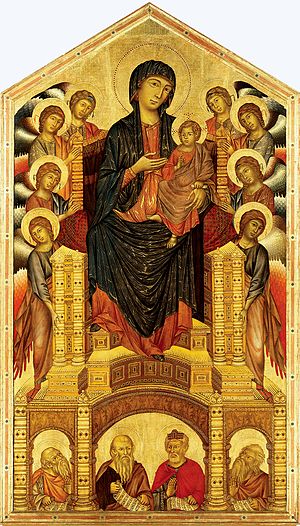Santa Trinita Maestà
| Santa Trinita Maestà | |
|---|---|
 |
|
| Artist | Cimabue |
| Year | 1280-1290 |
| Medium | Tempera on panel |
| Dimensions | 385 cm × 223 cm (152 in × 88 in) |
| Location | Uffizi Gallery, Florence |
The Santa Trinita Maestà (Italian: Maestà di Santa Trinita) is a painting by the Italian medieval artist Cimabue, dating to c. 1290–1300. Originally painted for the church of Santa Trinita, Florence, where it remained until 1471, it is now housed in the Uffizi Gallery of Florence, Italy.
A Renaissance painting created in Florence, it was replaced with Trinity by Alesso Baldovinetti (1471), and moved into a side chapel of the same church, and later the monastery infirmary.
Vasari assigned this painting to Cimabue, and the attribution has been confirmed by most modern scholars, although the dating remains disputed. In addition, the claim that the artwork was commissioned by the Vallumbrosans, of which there is no evidence, has also been debated.
A striking feature of the painting is the wide opening at the base of the throne which depicts arches framing Jeremiah, Abraham, David, and Isaiah in half bust view. Below, at the sides of the throne, Jeremiah and Isaiah gaze up towards the child as if to confirm the prophecies written in their documents on the miraculous virgin birth of Jesus.
Abraham and David in the center below the throne recall that Jesus descended from their lineage. The Christian meaning of the work, well-fitted to a church dedicated to the Holy Trinity, is thus focused on the threefold nature of the Virgin who is surrounded by the Holy Spirit.
...
Wikipedia
